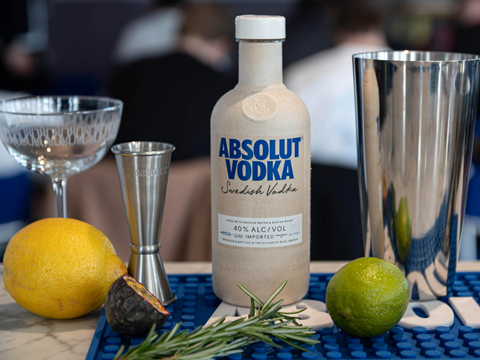
Absolut says it has successfully trialled an ‘industry-first’ paper-based cap and bottle duo in collaboration with Blue Ocean Closures (BOC), as part of its goal to create a fully biobased bottle.
According to Absolut, in the first generation the cap’s design will combine a body made of over 95% FSC certified fibres with a thin top-seal barrier made of plastic. The long-term ambition is to replace the plastic with a biobased material so the entire cap will be made of renewable materials.
The company states that a cap made primarily from renewable material has the potential to reduce carbon footprint compared to conventional materials such as aluminium. The cap will be recyclable as paper, in markets that have recycling systems in place that can separate paper from other materials.
The paper-based cap and bottle combination was trialled for the first time by bartenders at the Absolut The Map event in May. The test sought to evaluate the functionality, handling and overall impression of the cap in ‘real-life’ situations. Absolut plans to conduct further quality testing in future, followed by a limited in-market trial.
Last year Paboco and Blue Ocean Closures collaborated on the ‘industry’s first’ market-ready paper bottle and fibre-based cap combination, with a thin barrier enabling the package to be recycled as paper packaging. Blue Ocean Closures released a standard closure for solids and pills, said to be immediately ready for market use.
More recently, Frugalpac’s paper wine bottles went on sale at Target stores in a move anticipated to save almost 87.8 tons of CO2e. Made from 94% recycled paperboard and a certified recyclable plastic pouch, the bottle is said to be up to five times lighter than a standard glass bottle.
If you liked this story, you might also enjoy:
The ultimate guide to the Packaging and Packaging Waste Regulation in 2025
How are the top brands progressing on packaging sustainability?
Everything you need to know about global packaging sustainability regulation in 2025
The key to increasing the use of reusable packaging in supermarkets














No comments yet